Index of Economic Freedom 2006
The Heritage Foundation’s annual Index of Economic Freedom is out.
The rankings, the top 20 of which are pictured below, will surprise those who haven’t seen the list before.
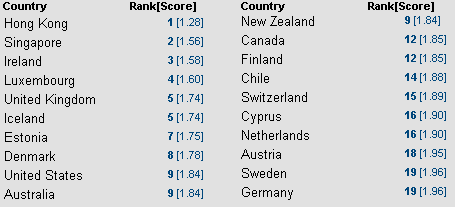
Hong King, a city in Communist China, and Singapore, a country renowned for brutal beatings for relatively minor criminal offenses, top the list. How can that be?
William W. Beach and Marc A. Miles explain why in the Methodology section.
Economic freedom is defined as the absence of government coercion or constraint on the production, distribution, or consumption of goods and services beyond the extent necessary for citizens to protect and maintain liberty itself. In other words, people are free to work, produce, consume, and invest in the ways they feel are most productive.
All government action involves coercion. Some minimal coercion is necessary for the citizens of a community or nation to defend themselves, promote the evolution of civil society, and enjoy the fruits of their labor. This Lockean idea was embodied in the U.S. Constitution. For example, citizens are taxed to provide revenue for the protection of person and property as well as for a common defense. Most political theorists also accept that certain goods-what economists call “public goods”-can be supplied most conveniently by government.
When government coercion rises beyond that minimal level, however, it risks trampling on freedom. When it starts interfering in the market beyond the protection of person and property, it risks undermining economic freedom. Exactly where that line is crossed is open to reasoned debate. The goal in the scoring of economic freedom is not to define these extremes-either anarchy or utopia-but to describe the world’s economies as they are.
I would contend that divorcing “economic freedom” from “freedom” is problematic. Philip Bowring leaves that aside and argues that these countries aren’t really particularly free in purely economic terms.
It is clear is that the rankings of Hong Kong and Singapore are based to a significant degree on ignorance of their domestic economies. In its 10-point assessment, the Heritage Foundation puts a high premium on freedoms for foreigners to trade and invest and enjoy low taxes, and remarkably little on the freedoms of the local inhabitants. Both places rightly score highly on free trade. City states that owe their existence to entrepot trade naturally avoid import tariffs or pesky currency regulations. Equally, they both give a more or less free hand to foreign investors in externally oriented industries.
A closer look at both economies, however, calls into question the description of their trading and ownership environments as “free.”
In Hong Kong, a handful of private groups operate domestic monopolies or oligopolies in power, retailing and transport, all linked to a few major property development companies, which also own media and other major domestic enterprises. Foreigners who have tried to enter – as the French group Carrefour did into retailing – have been squeezed out by anti-competitive cartels. The government, meanwhile, in the name of being business-friendly, resists competition or anti-trust laws that might open up these markets.
In Singapore, it is the government itself that stands in the way of the unfettered private enterprise that the Heritage Foundation’s criteria are supposed to favor. The major real estate, banking, transport, manufacturing and utility companies listed on the stock market are all government-controlled entities. They may be efficient, but is this an economy free of government intervention? The index also claims that “the market sets almost all wages.” But actually “wages are based on annual recommendations made by the tripartite National Wages Council.”
Tax rates and revenue as a percentage of gross domestic product are low in both cities. But governments control land supply and use it not just to raise money but to redistribute income in an off-the-books manner through publicly developed and managed housing provided with low-cost land, in which 83 percent of Singaporeans and 40 percent of Hong Kong citizens live. In Hong Kong, land prices for the rest are kept especially high, with the result that living space per inhabitant remains very low compared with countries with similar income levels. Land in Hong Kong is sometimes used for subsidizing favored industries and in Singapore tax subsidies – which by definition are discriminatory – are common.
Countries that are good to do business with are not necessarily good to do business in. An index of “economic freedom” that does not take the latter into account is flawed, indeed.
via Kerry Howley
Update: A comparison of the scoring rationales for Hong Kong and the USA might be illustrative. (Rating summaries only in the interest of fair use and brevity.)
The Special Administrative Region (SAR) of Hong Kong remains a model of economic freedom. It is a free port with no barriers to trade; has simple procedures for starting enterprises, free entry of foreign capital and repatriation of earnings, and transparency; and operates under the rule of law. The government has outlined a plan to balance the budget by fiscal year 2006—2007, primarily by reducing the size of the civil service to 160,000 by 2006—2007 from 2004 levels of 172,000. It also has raised the standard salary tax rate to 16 percent from 15 percent and has reduced personal tax deductions. Hong Kong weathered political storms during 2004 and 2005. After suffering a loss of confidence following massive pro-democracy demonstrations in 2003 and 2004, Chief Executive C. H. Tung finally announced his resignation in March 2005. Tung’s departure raised hopes of early democratic reforms. Instead, China bent Hong Kong’s constitutional strictures, announcing that Tung’s successor would complete the term and run for re-election by the 800-person election committee in 2007. Because there is no provision in the Basic Law for election reforms prior to the 2007 selection process, this announcement forecloses reforms until at least 2012. Nonetheless, China’s new leadership seemed comfortable with the prospect of Tung’s deputy, Chief Secretary Donald Tsang, a practicing Roman Catholic and Knight of the British Empire, becoming his successor. Tsang was formally installed in June 2005, and polls showed that 74 percent of Hong Kong citizens would have voted for him—if they could vote. Hong Kong’s fiscal burden of government score is 0.2 point better this year, and its government intervention score is 0.5 point better. As a result, Hong Kong’s overall score is 0.07 point better this year.
Historically, the U.S. Constitution has provided strong protections for private property and economic liberties. Since World War II, the United States has generally taken a strong leadership position in expanding global trade through lower tariff barriers. Subsequent moves to deregulate, cut tax rates, follow stable monetary policy, and protect intellectual property rights have engendered strong growth. Regrettably, some recent trends have raised questions about such traditions. The U.S. Supreme Court’s June 23, 2005, Kelo v. City of New London ruling on eminent domain exposes many Americans’ property to arbitrary seizure; and while countries in Eastern Europe are adopting flat taxes, deregulating, and privatizing, the U.S. may be drifting toward bigger government. The U.S. has continued a leadership role in free trade with eight ratified free trade agreements, another signed agreement, and ongoing negotiations with other countries. However, continued use of the “anti-dumping” Byrd Amendment, combined with anti-China rhetoric, indicates an ongoing protectionist mindset. Moreover, legislated government spending under such laws as the massive farm subsidies of 2002, the massive Medicare prescription entitlement of 2003, and the massive transportation bill of 2005 has expanded without constraints, and Sarbanes—Oxley and other regulatory laws have raised compliance costs. The United States’ trade policy score is 0.5 point better this year, and its fiscal burden of government score is 0.1 point better. As a result, the United States’ overall score is 0.06 point better this year.
I can’t deny that the United States has, despite its general inclination toward free trade, quite a bit of protectionism for key industries.

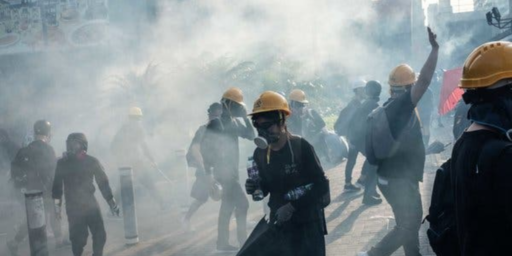

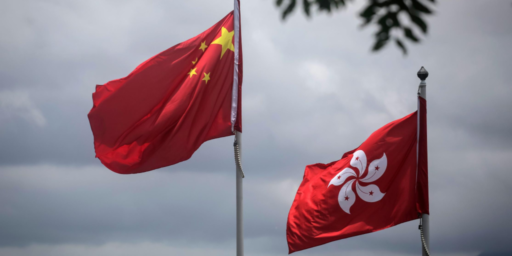
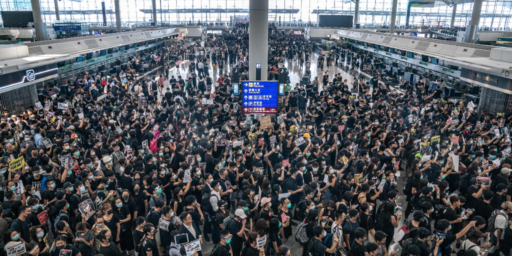
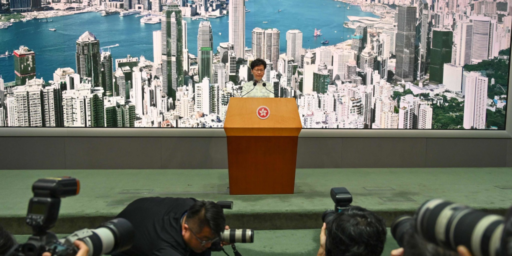
I think the survey defines economic freedom in terms of government obstacles to the common man making a living. The bureaucratic red tape for a businessman is minimal and there aren’t many forms of licenses required to open a business. Yes, Hong Kong is legally a part of China, but it retains almost all of its British Colonial laws regarding business and commerce. Chinese laws on the mainland do not apply to Hong Kong, even when it comes to public demonstrations agains the government. It’s also interesting to note that the UK rates higher, even with its more socialistic government.